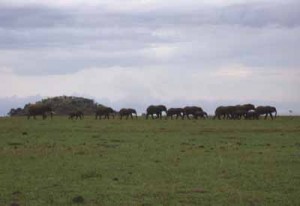Author: Kevin Krajick37
-

Did the Oceans Influence Human Evolution?
Scientists often invoke climate as a possible factor in human evolution; but only recently have they developed the ability to get enough information about past climates and related fossil evidence to see any details. A half-dozen leading paleontologists and climate scientists discussed recent advances in a symposium this week at the annual meeting of the…
-

Global Climate Modeling for the Masses: You Can Try This at Home
Since 2005, the Educational Global Climate Modeling Project has been downloaded 50,000 times, and adopted for teaching and research at hundreds of universities and other institutions.
-
Putting the ‘Death’ Back Into Death Valley?
Popular Tourist Stop May Have More Potential to Explode Than Thought
-
Scientists Make Progress in Assessing Tornado Seasons
Study Offers First Step in Short-Term Forecasting
-
In Himalayas, Assessing Climate Threats to Ice, and Water Supply
Bhutan’s Melting Glaciers May Affect Farming, Hydropower, Floods
-

Natural Disasters: The Upside
Floods, volcanoes, earthquakes–really, very little good news comes out of this sort of thing. Maybe the occasional feel-good story about, say, a child miraculously dug from the rubble days later, tired but unharmed and in good spirits, having survived on a cache of crackers and Coke. Actually, says John Mutter, an Earth Institute professor of sustainability studies, disasters can sometimes…
-

Under the Dead Sea, Warnings on Climate and Earthquakes
An international team of scientists drilling deep under the bed of the Dead Sea has found evidence that the sea may have dried up during a past warm period analogous to scenarios for climate change in coming decades. With nations in the volatile region already running short on water, the finding could be a…
-

Ethiopian Farmers Get First Payouts From New Crop Insurance Project
An innovative crop insurance program that protects small African farmers against extreme weather made its first payouts last week, to growers in northern Ethiopia. The pilot “microinsurance” program gave a total of $17,392 to 1,800 farmers in seven villages, following a drought earlier this year. The HARITA (Horn of Africa Risk Transfer for Adaptation) pilot was…
-

Farmers, Flames and Climate: Are We Entering an Age of ‘Mega-Fires’?
For millennia, people have set fires to clear land for cultivation, pastures or hunting; so-called slash-and-burn agriculture is still common across much of tropical Africa, Asia and South America. It has been a useful strategy–but …
